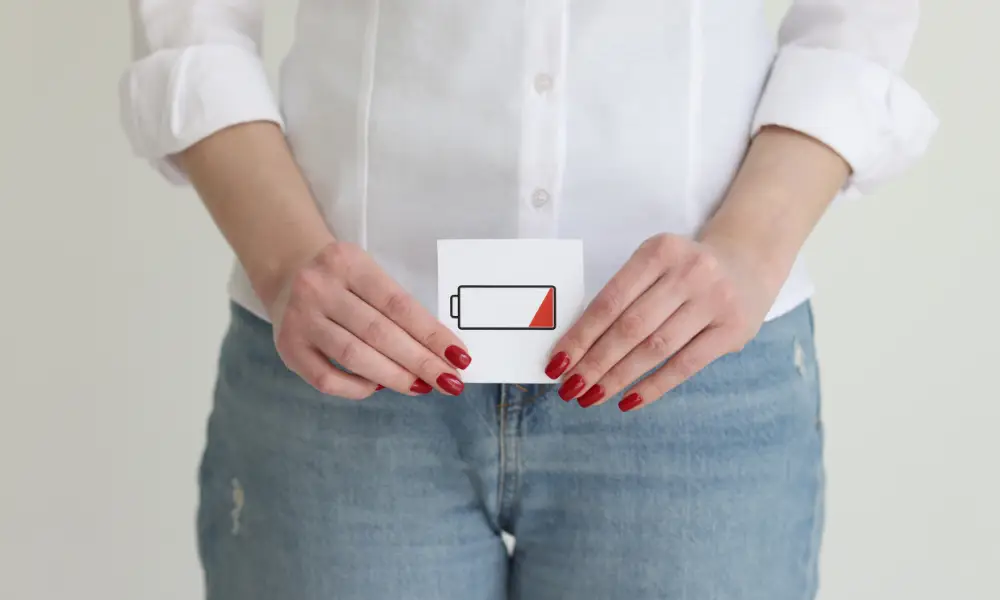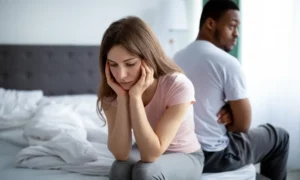Low libido in postmenopausal females is a prevalent and often overlooked issue that can significantly impact a woman’s overall well-being. Postmenopause brings about hormonal changes that can affect sexual desire and satisfaction. In this article, we’ll delve into the various aspects of treatment for low libido in postmenopausal females exploring both traditional and emerging methods.
Contents
Understanding Postmenopausal Low Libido 
Menopausal women often experience a decline in libido due to hormonal changes that occur during this stage of life. The main hormonal shift is a decrease in estrogen levels, which can have various effects on a woman’s body, including changes in sexual desire and arousal.
Low libido, also known as hypoactive sexual desire or low sex drive, refers to a diminished interest or desire for sexual activity. Individuals experiencing low libido may have a reduced interest in engaging in sexual activities, and this can affect their overall sexual satisfaction and the quality of their intimate relationships. Various factors can contribute to low libido, including physical, psychological, and hormonal factors. It is essential to address the underlying causes and seek appropriate medical or psychological guidance for treatment for low libido in postmenopausal females if low libido becomes a persistent concern.
Common Causes of Low Libido In Postmenopausal Women
Estrogen plays a crucial role in maintaining the health of the reproductive tissues, including the vaginal lining and the clitoris. A decrease in estrogen can lead to symptoms such as vaginal dryness, reduced blood flow to the genital area, and a decrease in overall sexual comfort. These physical changes can contribute to a lower libido and make sexual activity less appealing or enjoyable.
Additionally, menopause can bring about other factors that may affect libido, including:
- Mood changes: Menopausal women may experience mood swings, irritability, or even depression, which can impact their overall interest in sexual activities.
- Fatigue: Menopausal symptoms such as hot flashes and night sweats can disrupt sleep, leading to fatigue and reduced energy levels, which may affect sexual desire.
- Body image concerns: Changes in weight and body composition during menopause can sometimes affect a woman’s self-esteem and body image, influencing her confidence and interest in sexual activity.
- Relationship dynamics: Changes in libido can also be influenced by relationship factors, such as communication issues, emotional intimacy, or stress within the relationship.
It’s important to note that the impact of menopause on libido varies from woman to woman. Some women may not experience a significant decrease in libido, while others may find it more challenging. Addressing these concerns often involves a comprehensive approach, including open communication with a partner, seeking medical advice, and exploring lifestyle changes or therapies to improve overall well-being.
Treatment Options For Low Libido In Postmenopausal Females

The treatment of lower libido in women can involve a combination of medical, psychological, and lifestyle approaches. It’s important to consult with a healthcare professional to identify the underlying causes and tailor a treatment plan to individual needs. Here are some potential strategies:
- Hormone therapy
For women experiencing lower libido due to hormonal changes associated with menopause, hormone replacement therapy (HRT) may be considered. Estrogen therapy can help alleviate symptoms like vaginal dryness and discomfort. - Medications
Some medications may be prescribed to address specific issues affecting libido. For example, medications that enhance blood flow to the genital area or treat underlying conditions like depression or anxiety. - Counseling or therapy
Psychological factors can significantly impact libido. Sex therapy, couples counseling, or individual counseling can help address issues such as stress, relationship problems, body image concerns, or past traumas that may contribute to lower libido. - Lifestyle changes
Adopting a healthy lifestyle can positively impact libido. This includes regular exercise, a balanced diet, adequate sleep, and stress management techniques. Exercise, in particular, has been shown to improve sexual function and overall well-being. - Communication with a partner
Open and honest communication with a partner is crucial. Discussing desires, concerns, and expectations can help create a supportive and understanding environment, fostering intimacy and connection. - Erotic aids
Some women may find that incorporating erotic aids, such as lubricants, vibrators, or other sexual accessories, can enhance their sexual experience and contribute to increased satisfaction. - Addressing relationship issues
Relationship dynamics play a significant role in sexual desire. Working on improving communication, emotional intimacy, and resolving conflicts within the relationship can positively impact libido. - Mindfulness and relaxation techniques
Practices like mindfulness meditation and deep breathing exercises can help reduce stress and anxiety, creating a more relaxed state that is conducive to sexual desire.
It’s important to remember that addressing lower libido often involves a multifaceted approach. Consulting with a healthcare provider, preferably a specialist in sexual health, can help identify the most appropriate interventions based on the individual’s specific circumstances and needs.
Importance Of Hormone Therapy
Hormone therapy (HT) is one approach to address lowered libido in menopausal women. During menopause, a woman’s body experiences a decline in estrogen levels, which can contribute to various symptoms, including a decrease in sexual desire. Hormone therapy aims to supplement or replace these hormones to alleviate symptoms. Here are some key points about hormonal therapy for increasing libido in menopausal women:
Estrogen Therapy
Estrogen therapy involves the administration of estrogen to replace the declining levels in menopausal women. It can be delivered through various forms, including oral tablets, patches, creams, or vaginal rings. By restoring estrogen levels, this therapy can help improve symptoms such as vaginal dryness, discomfort during intercourse, and potentially enhance libido.
Combination Therapy
Some women may receive a combination of estrogen and progesterone (in women with a uterus) to balance hormone levels. The addition of progesterone helps protect the uterine lining and is often recommended for women who still have their uterus.
Testosterone Therapy
Testosterone, often considered a male hormone, also plays a role in female sexual function. Some women may benefit from testosterone supplementation to improve libido and sexual satisfaction. However, the use of testosterone in women is somewhat controversial, and the risks and benefits should be carefully considered.
Individualized Treatment Plans
Hormone therapy should be tailored to each woman’s individual needs, taking into account her medical history, overall health, and specific symptoms. The decision to undergo hormone therapy should involve a thorough discussion with a healthcare provider, weighing the potential benefits against the risks.
Regular Monitoring
Women undergoing hormone therapy should be regularly monitored by their healthcare provider to assess the effectiveness of the treatment and adjust hormone levels as needed. Monitoring can also help manage potential side effects and ensure overall health.
It’s essential to note that while hormone therapy can be effective for addressing certain symptoms of menopause, including low libido, it may not be suitable for every woman. The decision to undergo hormone therapy should be made in consultation with a healthcare professional who can provide personalized advice based on an individual’s health status, medical history, and preferences. Additionally, non-hormonal approaches and lifestyle modifications can also play a role in managing lowered libido during menopause.
Conclusion
In conclusion, addressing low libido in menopausal women requires a comprehensive approach that considers physical, emotional, and relational aspects. Open communication, lifestyle adjustments, and professional guidance can all play a pivotal role in enhancing intimacy and overall well-being during this transformative phase of life.
If you are facing menopause related issues, menopause treatment at HerMantra can help. Book your free trial online menopause treatment session now.





